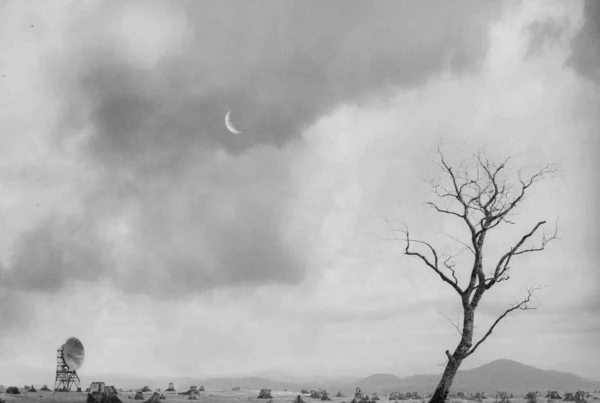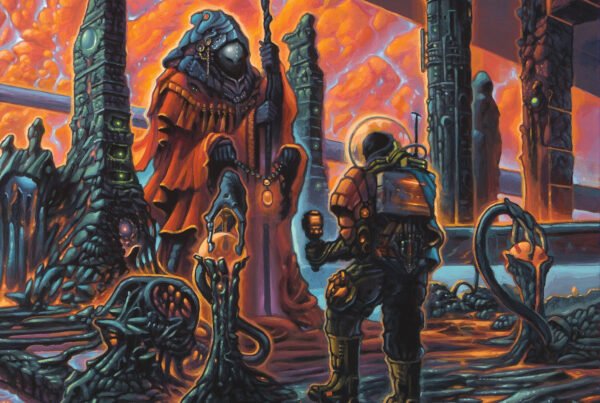Tim Linghaus expands his own dream pop world and explores dramatic experiences through the eyes of a little child on new release, VENUS YEARS.
Release date: December 11, 2020 | Schole Records | Bandcamp | Facebook | Instagram
Before discussing this record, I’d like to talk a bit about music creation in general. You see, some of you might be creators: either music creators, visual arts creators, or whatever discipline it is that you endeavor in. I think you’ll agree with me when I say that creation is the result of decisions, of choices. Either aware or completely subconscious, these decisions are extensions of our personality and shape the way we’d like to communicate things to the world. This principle can also be applied to most aspects of life itself. For me, when it comes to music, it becomes truly visible. That, or I just might be always looking for explanations, motivations, incentives… even if they do not exist. In any case, bearing this in mind provides an extra layer of depth when listening to albums like this one.
That being said, we’re about to discuss Tim Linghaus’ VENUS YEARS, a highly personal album that constitutes the second part of a story involving divorce as the main topic. Through the course of 43 minutes, the artist makes use of the same brushstrokes that would be part of a proper hit pop album but chooses to create this dream-like entity where ‘K’, the main character, delves into his inner feelings. “Danger Zones”, the single, is an example of how music articulates with narration and how elements of mainstream genres are deployed in unusual manners. Hanna, a fellow writer here at Everything Is Noise, described this song as being a late-night piece that’s better enjoyed in bed in a premiere published last month.
I could not agree more, because it is at that moment where the perception of details arises, evoking the clearest image possible of Linghaus’ creation. This too will further assist the analysis I’d like to share of this album. Unlike We Were Young When You Left Home, the artist’s previous release, soundscapes from VENUS YEARS align with a darker mood that complements its predecessor and enhances the imagery of this story. The artwork, by Alex Hanke, helped me substantially in conceiving the setting of this story.
According to the album’s Bandcamp page, ‘Coping with solitude, rediscovering structure, the significance of the new daily routine, and regaining self-confidence are the key themes upon which the music is built’. Indeed. Synth pads, slow-paced beats, and overwhelmingly modulated vocals are the main components in Tim Linghaus’ palette for displaying this private revival through the eyes of K. Far from being a dead-straight pop record, there’s a lot of space in it, which results in a dream pop/ambient record that becomes the soundtrack for the character’s process. What is more, how these elements are placed and used throughout the album suggests to me that they are enhancers – but, of what? Hang on to that, I’ll explain later on.
As far as lyrical content goes, I sense that this character was reminiscing experiences tied to his parents’ break-up, which must have definitely affected him. In the song “You Called It Love”, the image of this boy urging for an escape is clear: ‘Motionless/In the morning/From the bathroom/Everything was good/In a shelter from the world’. One could argue that VENUS YEARS represents K’s mental shelter where he faces his emotions. Thus, the way musical ingredients are introduced and blended carves the essence of K’s mindset.
At this point is where choices, like how to tell this story, come around. Being a record close to ambient music, the subtlest variation or texture can influence the intention of the piece, and hence, its meaning and interpretation. Each note, synth preset, vocal line, and any other musical input, therefore, arises among the artist’s willingness and responsibility to – see, here we are – enhance the piece’s concept.
As I got immersed in this album, I looked for elements that could help me visualize the narrator and his world, thus distinguishing Linghaus’ contributions. My starting point was the album artwork and then the lyrics. Once the image in my head was built, I kept trying to understand how the music appealed to the character’s trip and what could I draw from it. That’s when this gallant idea came through my mind and planted the necessary seed for comprehending the album’s concept. By focusing on the use of vocal synthesis, I reckoned on the sense of plurality that is conveyed through these harmonization tools.
Singular melodies result in multiple ornaments, creating this droid-like persona and consequently absorbing the character’s voice. In other words, hidden in the many layers of synthesized melodies, the lack of original voice made me relate to this situation where K creates an imaginary comfort zone, through this persona, in which to speak his thoughts on a dramatic, life-changing experience. Throughout the album, this source of power becomes the pillar of the world he creates for this reminiscence. In tracks such as “Unfold” or “Roads”, though short-lived, you can appreciate how the vocoder melodies stand as the primordial expression tool, whereas songs like “Rebuild” or “Home For The Kids” rely upon reverberated guitars and keys as their main expressive element.
Now, we’ve mentioned the importance of artists’ decisions, late-night music, divorce, vocoders, and much more. How does it all come together? Well, it’s honestly no easy task unravelling all these concepts into one straight structure where it’s clear to depict how they entangle themselves. It’s simply not supposed to be that way. Being an album that is meant to be listened from start to finish, VENUS YEARS provides the ideal experience for us to participate in a charming, yet dark, daydream where the character’s memories are displayed through a widely intimate setting. If you’re looking to skim a few songs before deciding if the record’s worth your time, the aforementioned tracks encompass most of what VENUS YEARS has to offer. Just consider that songs make much more sense while listening to the album in the correct order.
Though Tim Linghaus presents an album with a musical identity, narration, and lots of air for interpretation, its true nature will forever be unreachable for us, the listeners. The best way to appraise all the edges it has to offer is to spare yourself three quarters of an hour during a quiet night, lay in bed and let your mind flow through this scenery. You’ll be able to draw your own images of this world while enjoying sentimental tunes running soothingly. Maybe your take on this record ends up differing abruptly from what I interpreted in this review. That’s the magic of it all.






